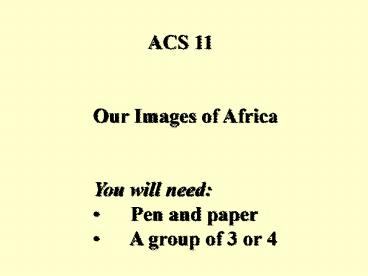Africa: Myths and Reality - PowerPoint PPT Presentation
1 / 27
Title:
Africa: Myths and Reality
Description:
A group of 3 or 4. What do you already know about Africa? ... Historiography: Methods, theories, and principles of historical writing and research ... – PowerPoint PPT presentation
Number of Views:71
Avg rating:3.0/5.0
Title: Africa: Myths and Reality
1
- ACS 11
- Our Images of Africa
- You will need
- Pen and paper
- A group of 3 or 4
2
What do you already know about Africa?
Write down the first 5 words that you think of
when you hear the word Africa.
3
WARNING
4
A picture is worth a thousand words
- Discuss in your groups for 1 minute each
- What messages do the following images send us
about life in Africa? - Do you think they are accurate?
- How do you react to each picture?
5
(No Transcript)
6
(No Transcript)
7
(No Transcript)
8
(No Transcript)
9
(No Transcript)
10
(No Transcript)
11
(No Transcript)
12
Some things we will be learning about...
13
Geography Savannas
14
Geography Victoria Falls (Mosi-oa-tunya)
15
Cairo
16
Slavery
17
Civil Rights Movement
18
Nationalist Movements
19
Great Zimbabwe
20
Mansa Musa
21
Nelson Mandella
22
Nineteenth century philosopher Friedrich Hegel
once described Africans as a people without a
history.
Europeans during this era often referred to
Africa as The Dark Continent.
Do you think these are fair statements? Why or
why not?
Where do you think these perceptions may have
come from?
23
Why do we study African heritage?
24
Definitions
- Ethnocentrism Focuses primarily on the
experiences and achievements of one culture or
national group, and its beliefs and feelings of
superiority over others. - Eurocentrism Centered on the perspectives of
Europeans and people of European descent
25
- Afrocentrism and Afrocentricity Focuses
primarily on the experiences and achievements of
people of African descent. African history is
presented from and African point of view and not
European bias. It focuses on African culture and
the continual survival and unity of African
peoples, irrespective of national borders. - Historiography Methods, theories, and principles
of historical writing and research
26
What causes change in culture?
27
- Force of media
- Changing styles
- Blend of cultural traditions































